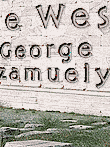Perhaps
it has something to do with geopolitics then? "Like most
Americans, I saw Communism as monolithic," wailed Robert
McNamara in his recent book, In Retrospect: The Tragedy
and Lessons of Vietnam, "I believed the Soviets and Chinese
were cooperating in trying to extend their hegemony. In
hindsight, of course, it is clear that they had no unified
strategy after the late 1950s. But their split grew slowly
and only gradually became apparent." McNamara has never
been one to let conventional wisdom pass by without his
giving noisy and vigorous assent to it. Back in the 1960s
the Sino-Soviet split was a life raft to innumerable Cold
Warriors like Arthur M. Schlesinger, Jr. who decided to
jump ship. Then as now, the arguments were amazingly feeble
and served merely to rationalize their perfectly understandable
impulse to get the hell out of Southeast Asia. If the US
government really believed in something called "monolithic
Communism," it would have come as news to Yugoslav leader
Josip Bro. Tito, who for 20 years had been the beneficiary
of American largesse on account of his supposed "independent"
brand of Communism. Moreover, whatever differences may have
existed between the Soviets and the Chinese, when it came
to Indochina they were very much in agreement. They wanted
the Americans beaten and sent on their way. That is why
they continued to cooperate arming Hanoi. When the triumphant
Democratic Republic of Vietnam turned over to the Soviets
the former US bases of Da Nang and Cam Ranh Bay, it was
Cold War conventional wisdom that was vindicated, not the
newfangled Schlesinger-McNamara one.
Perhaps
we have learned to do without "domino theories"? Hardly.
Here is an excerpt from a National Security Council document
from early 1952, "United States Objectives and Courses of
Action in Southeast Asia":
"Communist
domination…of all Southeast Asia would seriously endanger…United
States security interests. The loss of any of the countries
of Southeast Asia to communist aggression would have critical
psychological, political and economic consequences. In the
absence of effective and timely counteraction, the loss
of any single country would probably lead to relatively
swift submission to or alignment with communism by the remaining
countries of this group. Furthermore, an alignment with
communism of the rest of Southeast Asia and India, and in
the longer term, of the Middle East (with the probable exceptions
of at least Pakistan and Turkey) would in all probability
progressively follow: Such widespread alignment would endanger
the stability and security of Europe….Southeast Asia, especially
Malaya and Indonesia, is the principal world source of natural
rubber and tin, and a producer of petroleum and other strategically
important commodities. The rice exports of Burma and Thailand
are critically important to Malaya, Ceylon and Hong Kong….The
loss of Southeast Asia, especially of Malaya and Indonesia,
could result in such economic and political pressures in
Japan as to make it extremely difficult to prevent Japan's
eventual accommodation to Communism."
The
document is worth quoting at length because it enunciates
the "domino theory" at its purest. The fate of the world
hangs on what happens in Indochina. Any reluctance on the
part of the United States to get involved would have catastrophic
consequences. Variations on this theme were to be repeated
again and again under Eisenhower, Kennedy, Johnson and Nixon.
Compare the passage above with Bill Clinton's explanation
to the American people on March 24, 1999 as to why he had
just ordered the bombing of Yugoslavia:
"Kosovo
is a small place, but it sits on a major fault line between
Europe, Asia and the Middle East, at the meeting place of
Islam and both the Western and Orthodox branches of Christianity.
To the south are our allies, Greece and Turkey; to the north,
our new democratic allies in Central Europe. And all around
Kosovo there are other small countries, struggling with
their own economic and political challenges-countries that
could be overwhelmed by a large, new wave of refugees from
Kosovo. All the ingredients for a major war are there: ancient
grievances, struggling democracies, and in the center of
it all a dictator in Serbia who has done nothing since the
Cold War ended but start new wars and pour gasoline on the
flames of ethnic and religious division. Already, this movement
is threatening the young democracy in Macedonia, which has
its own Albanian minority and a Turkish minority….Let a
fire burn here in this area and the flames will spread.
Eventually, key US allies could be drawn into a wider conflict,
a war we would be forced to confront later-only at far greater
risk and greater cost."
The
"domino theory" is alive and well, in other words. Indeed,
the world today seems to comprise the United States and
innumerable falling dominoes. Round every corner lurks a
new threat to US security. Unless the United States makes
a stand, cataclysm is sure to follow. Sometimes the scourge
is drugs. Sometimes it is "weapons of mass destruction."
Sometimes AIDS. Sometimes "rogue states." Sometimes it's
resurgent Russia or China. Sometimes terrorism. Sometimes
"ethnic hatred." And sometimes – when all the threats seem
exhausted – there is that plain old standby, "instability."
Interestingly, then as now, while policymakers anguish about
this or that, they invariably avoid making their case either
to the American people or to Congress. Here is a memorandum
from 1954 written by Robert Cutler, special assistant to
President Eisenhower: "The President went over the draft
of the speech which [John Foster] Dulles is going to make
tonight, making quite a few suggestions and changes in text.
He thought additionally the speech should include some easy
to understand slogans, such as 'The US will never start
a war', 'The US will never go to war without Congressional
authority', 'The US, as always, is trying to organize cooperative
efforts to sustain the peace'." It was all lies of course
but no different from last year's bromides about America's
going the extra mile to work out an agreement at Rambouillet.
The
truth is that the overriding lesson of Vietnam is that we
have learned nothing from it. Then as now, the United States
launches wars for no reason other than to secure its dominance
over other nations. Then, as now, the supposed "threats"
from which nations are to be saved serve merely as the agency
of American empire. Then as now, "allies" are really only
satellites. Then as now, the United States is sublimely
indifferent to the casualties – human, material, moral
and psychological – that it inflicts on other nations.
Why were we in Vietnam (to paraphrase a famous question)?
It certainly was not to stop the spread of Communism. In
1949 the Truman Administration did not seem too distressed
to see Chiang Kai-shek's armies crushed by those of Mao.
In 1954 the Eisenhower Administration rejected the entreaties
of the French to help them defeat Ho Chi Minh. In 1975 the
Communists seized all of Indochina, and Americans barely
noticed.
Were
we in Vietnam to help the South Vietnamese? Unlikely. Not
for one minute did US policymakers show the slightest respect
for the independence of the South Vietnamese. They were
to do as they were told. If they fell out of line, they
would be punished. A cablegram dated August 24, 1963 sent
by the State Department to Ambassador Henry Cabot Lodge
in Saigon gives one a sense of the arrogance of American
power: "US Government cannot tolerate situation in which
power lies in [Ngo Dinh] Nhu's hands. [Ngo Dinh] Diem must
be given chance to rid himself of Nhu and his coterie….If…Diem
remains obdurate and refuses, then we must face the possibility
that Diem himself cannot be preserved….You may also tell
appropriate military commanders we will give them direct
support in any interim period of breakdown central government
mechanism." As we know, it was this cable that began the
train of events that led to the overthrow and murder of
South Vietnam President Ngo Dinh Diem. The Americans had
got tired of Diem. He was too proud to follow unquestioningly
Washington's orders. Diem had to go. So he was subjected
to the, by now, standard American sanctimony and hypocrisy.
Diem was not – horror – a "democrat"! Washington's anxiety
in 1963 about "corruption" and the absence of "democracy'
in Saigon stood in marked contrast to its tolerance of the
savage repression then taking place in South Korea. In 1965
the same US policymakers who were berating Diem had few
problems with the horrifying massacres that followed the
suppression of the Communist-inspired coup in Indonesia.
Throughout
their years of involvement in Vietnam, US policymakers never
doubted their right to decide who would and who would not
serve in the Saigon Government. There was never any question
of withdrawal. If the President of South Vietnam "remains
obdurate," the United States would not pack up and leave
(the honorable thing to do). No, it would seek his overthrow.
Here are McGeorge Bundy's slimy words to Ambassador Lodge
written two days before the coup: "We do not accept as a
basis for US policy that we have no power to delay or discourage
a coup….We believe…you should take action to persuade coup
leaders to stop or delay any operation which, in your best
judgment, does not clearly give high prospect of success."
It is hard to see how America's attitudes towards its satellites
differed from those of the Soviet Union. If anything, they
were worse. In 1956, as Revolution engulfed Communist Hungary,
the Russians spirited out of the country the hated former
leader Matyas Rakosi. He was to die peacefully in the Soviet
Union 14 years later. Diem, a loyal American client was
brutally murdered.
"Nothing
succeeds like success," John Kenneth Galbraith, US
Ambassador to India, boasted following the fall of Diem.
And he was right. With Diem out of the way, the United States
could take over the war as well as the government and society
of South Vietnam. This was the objective all along. Three
weeks after the death of Diem, President Kennedy himself
was shot. It was justice of sorts. South Vietnam was now
subjected to bombing, defoliation, forcible transfer of
population. There was a lot of talk about "nation building."
By Americans that is, not the South Vietnamese. The other
day, Senator John McCain said that the wrong side won the
war in Vietnam. Perhaps. We do know that the right side
lost.










